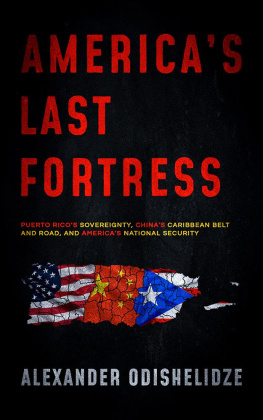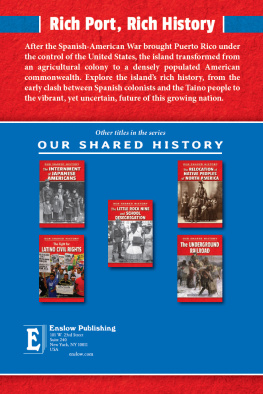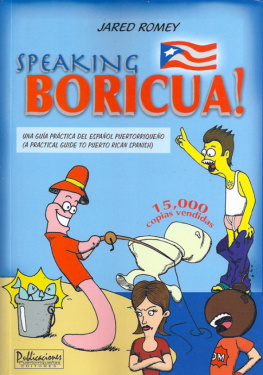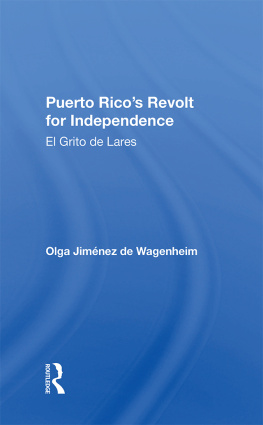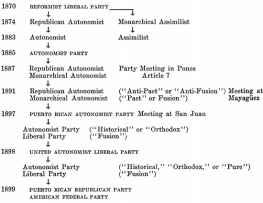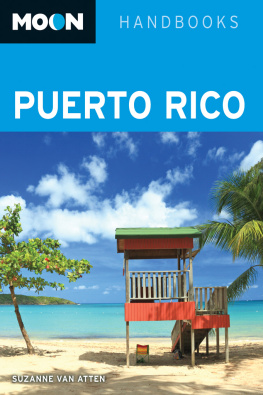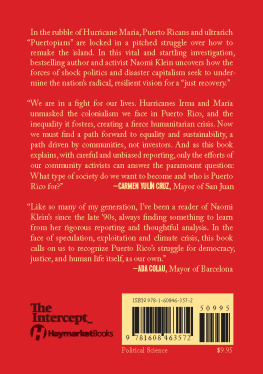Praise for Alexander Odishelidzes last book, Pay to the Order of Puerto Rico
It is fitting that we ask ourselves what future political status is best for Puerto Rico. This book answers that question and another: What status is also best for the United States?
Robert J. Lagomarsino
Former US Representative of California
Ranking Member of Subcommittee on Territorial Affairs
Just as Art Laffer helped start a revolution of thought about taxes on the mainland more than twenty-five years ago, he and Alex Odishelidze will begin a national debate about the relationship between the United States and Puerto Rico. Pay to the Order of Puerto Rico is an important book for understanding the roots and consequences of a failed economic policy.
The Honorable Jack Kemp
Mr. Odishelidzes book reveals the economic and social consequences of the confused and ambiguous territorial status policy Congress has implemented for Puerto Rico The sooner the better in order to bring about an orderly culmination of Puerto Ricos political progress from territory to a permanent status.
Richard Thornburgh
Former United States Attorney General
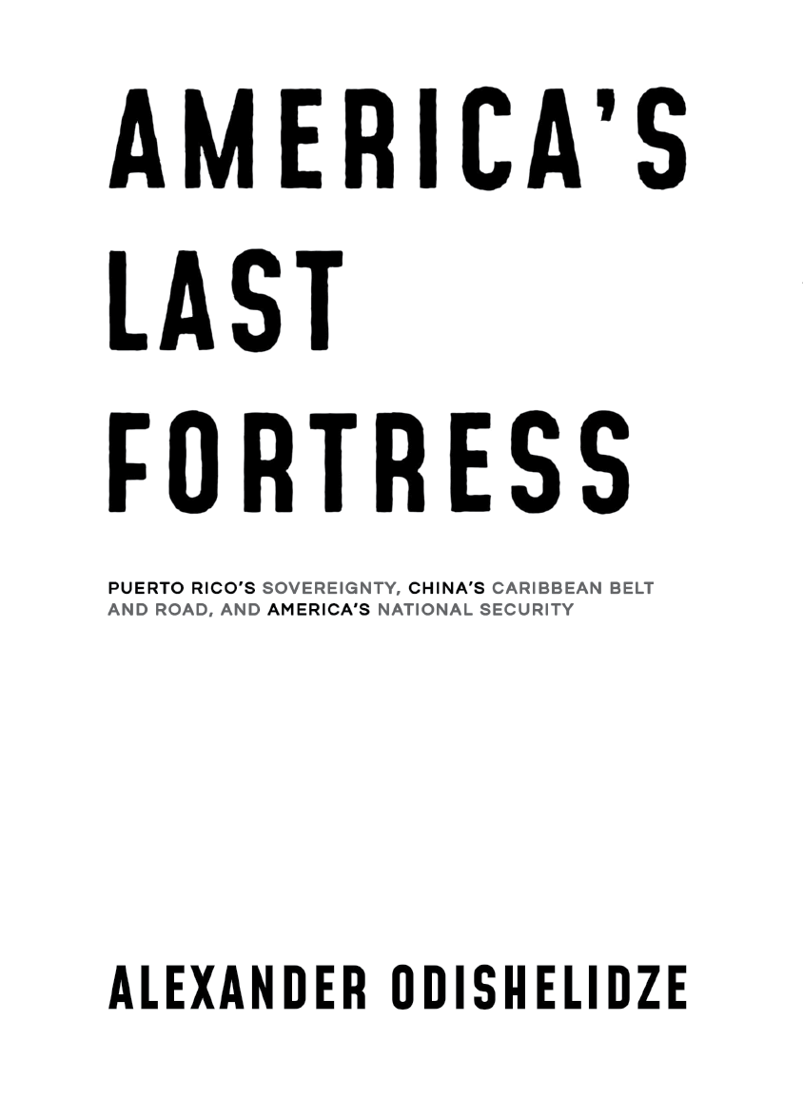
Copyright 2022 Alexander Odishelidze
Published by Omanagement LLC/Publishing Division
All rights reserved. No part of this publication in print or in electronic format may be reproduced, stored in a retrieval system, or transmitted in any form or by any means, electronic, mechanical, photocopying, recording, or otherwise without the prior written permission of the publisher.
The scanning, uploading, and distribution of this book without permission is a theft of the authors intellectual property. Thank you for your support of the authors rights.
Editing, design, and distribution by Bublish, Inc.
Available to bookstores and libraries through Ingram.
ISBN: 978-1-64704-513-5 (eBook)
ISBN: 978-1-64704-514-2 (paperback)
ISBN: 978-1-64704-515-9 (hardback)
Publishers Cataloging-In-Publication Data
(Prepared by The Donohue Group, Inc.)
Names: Odishelidze, Alexander, author.
Title: Americas last fortress : Puerto Ricos sovereignty, Chinas Caribbean Belt andRoad, and Americas national security / Alexander Odishelidze.
Description: [Puerto Rico] : [Omanagement LLC/Publishing Division], [2022] |Includes index.
Identifiers: ISBN 9781647045159 (hardback) | ISBN 9781647045142 (paperback) |ISBN 9781647045135 (ebook)
Subjects: LCSH: Puerto Rico--Foreign economic relations--China. | Puerto Rico--Foreign economic relations--Caribbean area. | Puerto Rico--Politics and government. | United States--Foreign relations--China. | Yi dai yi lu (Initiative : China) | National security--United States.
Classification: LCC HF1506.15.C6 O35 2022 | DDC 337.7295051--dc23
Dedication
I want to thank those who have been closest to me during the process of putting out this book, my immediate family. Thank you to my wife of 25 years, Odette, who is my best friend and lifetime companion. Like a real champ, she has always given me the support Ive neededboth in business and in life. Also, of course, thank you to my oldest son Sasha, my younger son Michael, and most of all to my granddaughter Allie, who is a real champ in her own right through her political, social media campaigning. Kudos to our younger generation. I know they will make this world right again!
Chinas Belt and Road initiative is on the way. Premier Xis agenda? For China to have unrestricted access to the rest of the world. At the focus is Americas last fortress, Puerto Rico, which sits primely at the southern entrance of the Caribbean from the Atlantic Ocean. The only way that China can exercise influence in Puerto Ricoand move freely around the globeis if Puerto Rico becomes an independent nation.
Puerto Ricos political process is in shambles and the island is now slipping toward independence. Author Alexander Odishelidze spent 30 years on decolonization with a preference for statehood. This is his firsthand account of the mistakes made during that process, and of the vested interestsboth on the mainland US and in Puerto Ricothat fought to maintain the status quo. In the 1970s, independence drew less than 5 percent of the vote in Puerto Ricos elections. During the last election, independence-leaning candidates received almost 50 percent of the vote.
The trend is away from statehood. And China is watching.
Contents
I first realized how serious Chinas interest in Puerto Rico was after giving a speech at the Wan Chai Rotary Club in Hong Kong in 2018. The subject of my talk was a book I had coauthored with economist Arthur Laffer, called Pay to the Order of Puerto Rico . It touched on various political, economic, racial, and ethnic issues on the island. Though I have made my life and money in Puerto Rico and spent the last sixty years plugged into its economy, culture, society, and politics, I am not Puerto Rican by birth. My youth was spent in Nazi-occupied Belgrade and later in Communist Yugoslavia. In 1960, at the age of nineteen, and after almost three years in European refugee camps, I landed in America with $20 in my pocket and no understanding of English. Its a long story, but many years later, I had become a successful family and businessman in Puerto Rico. Life is a fascinating journeymore on that later.
I share my Russian - w ho - i mmigrated - t o -A merica bio because it always seems to loosen up my Chinese audiences. When I first started meeting Chinese businesspeople, I would simply tell them that I was from America. After this news, they would politely shake my hand and walk away. When I started telling them I was a Russian who immigrated to America, things changed. I would get a big smile, a hug, and be called, tovarisch , which in Russian means comrade. I think you get the picture. So, when I shared my Soviet -b loc background with my Hong Kong -C hinese audience during my 2018 speech, they immediately assumed we were on the same side and felt they could share information with me much more freely. The evening would prove to be enlightening, to say th e least.
After my speech, I was surrounded by attendees asking questions. One mergers and acquisitions (M&A) professional, whod been born in Hong Kong but was not Chinese, showed special interest in my speech. He told me that his partners were Chinese from both Hong Kong and mainland China, and they were acquiring properties for the benefit of Chinese interests. He also explained that his clients were primarily focused on acquisitions in the US and Ca ribbean.
We are negotiating to buy Roosevelt Roads, he shared proudly.
Its possible my jaw physically dropped to the floor at this news. Roosevelt Roads was the original naval base established in Puerto Rico by the US government in 1943. Upgraded in 1957, the base was occasionally used by the Navy for training exercises. Mainly, though, it served as a permanent American footprint in the Caribbean for emergency defensive, quick -r esponse maneuvers to discourage aggressive intruders during WWII and the Cold War. In the early 1960s, when Khrushchev decided to put nuclear missiles in Cuba, the blockade ordered by President John F. Kennedy was mounted out of Roosevelt Roads. The US Department of Defense once called the base our permanent battleship in the Ca ribbean.
And its not just the base itself that has been strategically important. The construction of the Roosevelt Roads naval base included substantial excavations into the surrounding mountains during World War II, when England was under heavy German attack. The facility was designed to provide Churchill and the British government safe haven should they have to exile during the blitzkrieg. And in the 1970s, the Navy claimed proudly but secretly that it had spent $4 billion on this grid system alone and that it was one of the most modern, advanced, and important training tools for naval maneuvers. Then, in the early 2000s, President George W. Bush decided that America did not need protection in the Caribbean any longer. He turned the base over to the local Puerto Rican government. Since then, the Department of Defense has pulled out of Puerto Rico almost completely. Roosevelt Roads, along with other US military installations, was put up f or sale.
Next page
